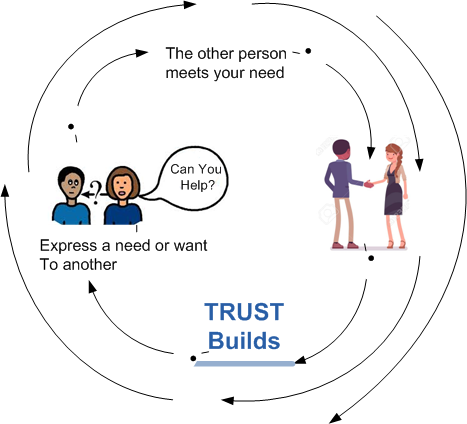Strong Point’s Leadership Rule #18: Be Known for Making and Keeping Promises
This leadership blog comes after a long break from the posting of Strong Points Leadership Rule #17: Wear Your Moral Compass on Your Sleeve. Its been percolating in my mind for quite some time. I think Ive researched more about making promises and keeping them, than any other leadership topic or Strong Point Leadership Rule that Ive written about so far.
I’ve tried to remember the last time a professional colleague made a promise to me. I’ve also asked myself “Why do I care?” anyway. “Why do promises even matter?… or DO they?” Why am I thinking that promises are so vital to Leadership? My research began with the formal definition of the word promise, and the images it conjures up for me.
| prom·ise Dictionary result for: A Promise | /ˈpräməs/ |
 | noun 1. a declaration or assurance that one will do a particular thing or that a specific thing will happen. “what happened to all of those promises of support?” synonyms: word of honor, word, assurance, pledge, vow, guarantee, oath, bond, undertaking, agreement, commitment, contract, covenant “if I don’t go I’ll be breaking my promise.” |
 Follow-through and do what you say you’re going to do | verb 1. assure someone that you will definitely do, give, or arrange something that you promised; undertake or declare that something will happen. “he promised to review my proposal and request for project funds.” synonyms: give one’s word, swear, pledge, vow, undertake, guarantee, assure, contract, engage, give, and undertaking, give an assurance, commit oneself, bind oneself, cross one’s heart (and hope to die), swear/take an oath, covenant; |
 Enable people to expect the best from you, without being disappointed | verb 2. give reasonable grounds for expectation (regarding a particular occurrence or situation). “forthcoming business results promise growth in the new year.” synonyms: indicate, give an/every indication of, lead one to expect, give reasonable grounds for expecting, point to, denote, signify, be a sign of, be evidence of, show signs of, hint at, suggest, give hope of, hold out hopes of, bespeak, presage, be a presage of, augur, herald, bode, foreshadow, portend; More |
A promise, as defined by the Merriam-Webster Dictionary, is: “a declaration that one will do or refrain from doing something specified; or a legally binding declaration that gives the person to whom it is made a right to expect or to claim the performance or forbearance of a specified act.”
I challenge you to remember the last time someone in your work life made a promise to you, and said those words out loud, “I Promise You,” and then followed through with his or her commitment.
I honestly can’t remember the last time someone made a promise to me at work. I can remember; however, a customer colleague reminding me and the Strong Point Team, deep in the midst of project worries and work, that she felt assured that we would work through every challenge and deliver on the promises we made. The sentiment made me feel really satisfied at a time when I otherwise felt, as I often do, mid-way through the guts of a project, weary and overwhelmed by the natural ebb and flow of deliverables vs. time left to complete the work.
The thing about promises that has my mind whirling with reflection is that they seem to occur less often than they used to. Earlier in my work life, commitments of quality, global launches, software releases, pilot programs, and value-added partnerships were heavy laden with pledges of commitment. Customer promises and partnership promises were frequently expected, and as frequently delivered. People talked openly about promises. Businesses promoted them freely and shared the heart and intention behind them with authenticity. In today’s operating cultures, a lot less is said about promises. Fewer are made, I believe.
So why do we make promises? Why are they important? Promises relate to our need for certainty. The need for certainty, survival, and security is a basic human one. Anthony Robbins, the American author, entrepreneur, philanthropist and life coach, says Certainty is one of our six core human needs.
In his writings and in his work, Tony Robbins prioritizes certainty as one of the six human needs that are primary drivers to our behavior. The other five are the needs for safety, comfort, order, consistency, and control. He has cultivated a life-long fascination with human behavior, development and motivation. His thoughts and ideas come from his studies researching and merging concepts introduced through Neural Linguistic Programming, Cognitive Therapy, Gestalt Therapy and many other models of human behavior along with Maslow’s Hierarchy of Needs. His work is among the vast library of Leadership and Human Behavior and Development writings I have read. I believe any great leader is also a great student of human behavior. Strong leaders study their own behavior and pay particular attention to how it relates to the patterns of the leaders they admire most.
| Psychologically, certainty is based on a circle of trust. The circle of trust is illustrated this way: A person expresses a want or a need to another; the other person meets that need, then, a sense of trust or certainty develops. The more this circle of expressed need, met needs, and trust building continues, the higher the level of confidence and trust that ensues. Consistency is also a big part of certainty and trust building. |  |
Businesses are based on promises. Every contract is a promise between two parties. Every invoice sent has an expected promise to pay behind it. Every job description, every non-disclosure, non-compete, and personal development plan includes “a declaration that one will do what is specified.”
Rebecca Stone and Alexander Stremitzer, two UCLA Law students in 2015, wrote a paper, funded by a research grant called Promises, Reliance and Psychological Lock-In. It’s an excellent 40-page read that basically concludes that promises matter and that people who make promises are more likely to keep them with people who are known for keeping promises! It sounds kinda weird, but I understand it. I’m sure you do too, if you’re reading this. If you’re working with someone new, or teams of new colleagues as Strong Point often does, it takes time to build trust. Consistently making and keeping promises is one sure way to build trust. Thus Strong Point’s Leadership Rule #18: Be Known for Making and Keeping Promises.
The Business Transformation Project Work that Strong Point endeavors to regularly to design, manage and complete comes packed with promises made and kept. It’s often hard for Strong Point, as a smaller company, to gain the respect and opportunity as a trusted partner because the number and size of promises kept literally, does not match the number and size of promises kept by the competing partner(s).
The concept of “overinvestment” is one that resonated with me in Stone and Stremitzer’s paper. It turns out that smaller firms, like Strong Point, often overinvest time or financial and other resources, when negotiating a new contract, as means to show a larger, more established “promisee” that they are worthy of the first promise (i.e., business contract ) granted to them. The student lawyers prove that a well written binding contract equalizes this need to overinvest by the promisee and assures the promisor that promises defined in an agreement will be delivered. The authors of Promises, Reliance and Psychological Lock-In, support the notion throughout their research and writing, that we all want and need to “Lock-In” to promises made, to feel a sense of certainty and security.
Michelle Gielan, a journalist, wellness expert, former CBS News anchor, and contributor to Psychology Today, explained in her May 2010 blog Lights, Camera… Happiness! why keeping promises is good for you:
“When we don’t keep a promise to someone, it communicates to that person that we don’t value him or her. We have chosen to put something else ahead of our commitment. Even when we break small promises, others learn that they cannot count on us. Tiny fissures develop in our relationships marked by broken promises.”
There are so many other qualities of Leadership that support the value of making and keeping promises. Caring, integrity, and depth of character come to mind as vital aspects of Leadership. What prevents us from making them? John Templeton, a professor at the Keller Professional Sciences School at Chicago Booth says:
“‘Promises can be hard to keep, and promise-makers should spend their time keeping them wisely.”
“… maintaining good relations with other people does not require a superhuman effort. Do what you promise you’ll do, and people are grateful.”
Here are some examples of my favorite promises that leaders make to their team members, subordinates and peers:
| Make the Promise | Keep the Promise |
|---|---|
| Provide a reward for really tough work | This promise could be kept through:
|
| Invest in a person’s efforts to learn and grow | This promise could be kept through:
|
| Invest in a Team | This promise could be kept through:
|
If you’re out of practice making promises, here’s a suggestion. Lyn Dundee, a behavioral science researcher & practitioner, in her March 30th, 2018 article called Three Surprisingly Simple Steps to Create Meaningful Work published in The Ascent online publication, suggests making promises to yourself.
These are the three promises she made to herself:
- I promised myself that my work would bring research to life, to make the validated, reliable outcomes that promise a healthier and rewarding workplace actionable.
- I promised that I would apply science-backed strategies to convert work into a platform to enhance our own mental, spiritual and professional growth and development.
- I promised that my efforts would bring proven research into the workplace to explore how our day-to-day jobs can serve our greatest good.
I also liked what Lyn learned from making these commitments to herself. She explains that she strengthened her well-being, resilience, adaptability, and most importantly her sense of purpose and fulfillment. I’d add that these benefits also strengthen and advance leadership capability.
A lot of people believe its always better to under-commit and over-deliver when making promises. Yet, Sandy Smith, in her July 17th, 2014 EHS article titled Leadership: Keeping a Promise is Worth More Than Exceeding It, cites a Rady School of Management Study (Epley and Gneezy) that reminds us:
““ there’s little, or no benefit in putting forth a greater effort to exceed a promise when simply keeping a promise is so highly valued. “
Michelle Smith, in her August 21,st 2015 article called 7 Ways Leaders can Keep their Promises published in the TLNT Talent Management & HR Magazine, reminds us just how hard it can be just to keep the promises we’ve made. Her article highlights the phrase “Commitment Drift” and explains:
“Under the pressure of a quota, deadline, or amid the turmoil of constant change, some leaders experience “Commitment drift” in which critical promises are forgotten or broken.”
I like Michelle’s guidance to track your list of promises, to conduct periodic reviews of them, to focus on the process of keeping promises and not on the heroics. She recommends, too, that we all look for contradictions in our promises, and to ask ourselves if we’re making unspoken promises that are unintentional.
What I have found, through some of Strong Point’s most recent work, is that there’s often a lack of interest in making promises. I agree it’s hard to measure up and meet a promise once it’s made. I also think, that when people, partners, and team members don’t declare promises, and other commitments or unexpected outcomes creep in, people slink out without a word and one party is overburdened by the other party’s lack of responsibility and commitment. Making a promise and writing it down provides both parties the ability to engage in an interactive dialog and to adjust resources, thoughts, ideas, and plans when results veer off track. Promises are the I-beams of an active working partnership. They hold both parties up and enforce structures to build upon. The presence of promises is an indicator of the presence of Leadership Capability. When a person, partner or leader is willing to make them, a need is met and the first circle of trust is complete.
Strong Point’s Leadership Rule #18: Be Known for Making and Keeping Promises




